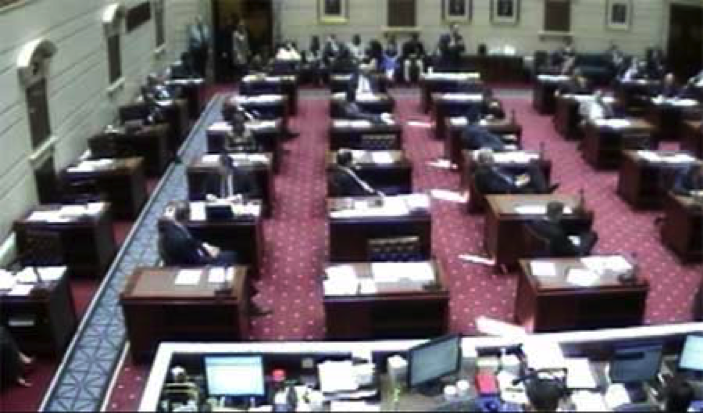- Send emails to your Oklahoma legislators asking them to pass the National Popular Vote bill
- Send a letter-to-editor to Oklahoma newspapers
- National Popular Vote’s Facebook page
- National Popular Vote’s Twitter page
In January 2021, Representative Jacob Rosecrants introduced the National Popular Vote bill was introduced into Oklahoma House of Representatives (status of HB1574).
On February 2, 2015, the National Popular Vote bill (HB 1686 [pdf]) was introduced into Oklahoma House of Representatives by Representative Lee Denney. Status of HB 1686
A survey of 893 Oklahoma voters conducted on January 19-20, 2015 showed 79% overall support for the idea that the President of the United States should be the candidate who receives the most popular votes in all 50 states. Voters were asked
"How do you think we should elect the President: Should it be the candidate who gets the most votes in all 50 states, or the current electoral college system?"
By political affiliation, support for a national popular vote was 71% among Republicans, 85% among Democrats, and 87% among independents/others. By gender, support was 86% among women and 72% among men. By age, support was 85% among 18-29 year olds, 80% among 30-45 year olds, 77% among 46-65 year olds, and 78% for those older than 65. By race, support was 80% among whites, 83% among African-Americans, and 71% among others (representing 10% of respondents).
In a second question, Oklahoma voters were asked
"Do you prefer a system where the candidate who gets the most votes in all 50 states on a nationwide basis is elected President, or one like the one used in Nebraska and Maine where electoral voters are dispensed by Congressional district, or one in which all of the state's electoral votes would be given to the statewide winner?"
- 71% preferred that the President be the candidate who gets most votes in all 50 states;
- 12% preferred that electoral votes be dispensed by congressional district; and
- 17% preferred that all electoral votes go to statewide winner in Oklahoma (the so-called "winner-take-all" rule).
In the cross-tabs on this second question, 64% of Republicans preferred that the President be the candidate who gets most vote in all 50 states; 15% preferred that electoral votes be dispensed by congressional district; and 21% preferred that all electoral votes go to statewide winner in Oklahoma (the so-called "winner-take-all" rule). 78% of Democrats preferred that the President be the candidate who gets most vote in all 50 states; 8% preferred that electoral votes be dispensed by congressional district; and 14% preferred that all electoral votes go to statewide winner. Among independents/others, 74% of Democrats preferred that the President be the candidate who gets most vote in all 50 states; 18% preferred that electoral votes be dispensed by congressional district; and 8% preferred that all electoral votes go to statewide winner in Oklahoma (the so-called "winner-take-all" rule).
The survey was conducted by Public Policy Polling, and has a margin of error of plus or minus 3 1/2%. Report with cross-tabs
On February 12, 2014, the Oklahoma Senate passed the National Popular Vote bill (SB 906) by a 28–18 margin. The bill was sponsored by Senator Rob Johnson and Representative Don Armes.

On September 4, 2013, an interim study hearing heard testimony about the National Popular Vote bill.
On February 20, 2013, the Senate Rules Committee approved the National Popular Vote bill (SB 906) by an 11–8 vote.
In February 2013, the National Popular Vote bill was introduced in the Oklahoma Senate by Senator Rob Johnson and co-authored by Representative Don Armes (SB 906).
On February 23, 2011, the Senate Rules Committee approved the National Popular Vote bill by an 11-3 vote, with Republicans favoring it 6–3 and Democrats favoring it 5–0. However, the bill was not taken up by the full Senate.
In January 2011, Senator John Sparks introduced the National Popular Vote bill [SB 841] in the Oklahoma Senate.
A survey of 800 Oklahoma voters conducted on May 5-6, 2009 showed 81% overall support for the idea that the President of the United States should be the candidate who receives the most popular votes in all 50 states. Oklahoma poll results
On January 2009, Oklahoma State Representative Ryan Kiesel introduced the National Popular Vote bill in the Oklahoma House of Representatives (HB 2207). Pearson letter to Legislature
On January 23, 2007, Oklahoma State Representative Darrell Gilbert introduced the National Popular Vote bill (HB 1466) into Oklahoma Legislature for the 2007 session.
In 1966, Delaware Attorney General David P. Buckson filed a lawsuit on behalf of the state of Delaware against New York (and other states) concerning the use of the winner-take-all rule in presidential elections. Under the winner-take-all rule (also called the "unit rule" or "general ticket" system), all of a state's electoral votes are awarded to the candidate who receives the most popular votes in each separate state. In 1966, Delaware led a group of 12 predominantly low-population states (including North Dakota, South Dakota, Wyoming, Utah, Arkansas, Kansas, Oklahoma, Iowa, Kentucky, Florida, and Pennsylvania) in suing New York in the U.S. Supreme Court. In State of Delaware v. State of New York, the plaintiff states argued that New York's use of the winner-take-all rule effectively disenfranchised voters in their states. The Supreme Court declined to hear the case (presumably because of the well-established constitutional provision that the manner of awarding electoral votes is exclusively a state decision). Ironically, the defendant (New York) is no longer an influential closely divided battleground state (as it was in the 1960s). Today, New York suffers the very same disenfranchisement as most of the less populous states because it too has become politically non-competitive. Today, a vote in New York is equal to a vote in Delaware or Oklahoma: votes in both are equally irrelevant in presidential elections.